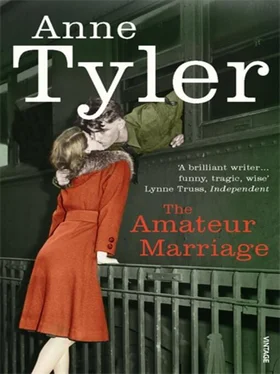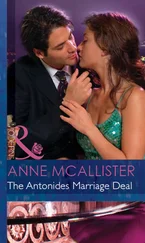“Know what?”
“Does he know that Pauline’s miffed? Did Wanda tell him?”
Now several of the women began to show some sense of urgency. “Wanda!” one called. “Wanda Bryk!”
She turned, her plate in midair.
“Did you tell Michael that Pauline’s not coming?”
“No, she wants him to worry,” Wanda said, and she turned back and plucked a pastry from a tray.
There was another silence. Then, “Ah,” the women said in unison.
The Dulcetones stopped playing and Mr. Kowalski tapped the microphone, sending a series of furry-sounding thwacks through the hall. “On behalf of myself and Barbara…” he said. His lips were too close to the mike and each b was an explosion. Several people covered their ears. Meanwhile, the children were getting up a game of Duck, Duck, Goose, and the babies were fussing themselves to sleep in nests of their mothers’ coats, and several young men near the beer kegs were growing loud-voiced and boastful.
So nobody noticed when Michael slipped away. Or maybe he didn’t slip away; maybe he walked out openly. Even his mother was absorbed by then in the goings-on, the speeches wishing Jerry well and the prayer from Father Pasko and the cheers and the rounds of applause.
But they noticed when he returned, all right, later in the evening. Here he came, brave as you please, leading Pauline by the hand through the big plank doors. And when he helped her take her coat off — which no one had even realized Michael knew to do — it emerged that she was wearing a slim black dress that set her apart from the other girls in their lace-up waistcoats and drawstring blouses and flouncy embroidered skirts. But it was her eyes that caused the most comment. They were wet. Each of those long lashes was a separate, damp spike. And the smile she gave Wanda Bryk was the rueful, wan, chastened smile of someone who had just come through a crying spell.
Oh, plainly she and Michael had been having words of some kind.
She turned from Wanda and looked at Michael expectantly, and he gathered himself together and squared his shoulders and took hold of her hand again. He led her further into the hall, past the microphone where Jerry himself now stood, foolishly grinning, past the accordionist who was flirting with Katie, over to the women on their cluster of folding chairs. “Mama,” he said to his mother, “I know you remember Pauline.”
His mother held a plate in both hands on the very tip end of her lap — a single beet swimming in horseradish sauce. She gazed up at him bleakly.
“Pauline is sort of… my girl,” he told her.
Even this late, the noise was deafening (all those overtired children on the loose), but where Mrs. Anton sat, the silence spread around her like ripples around a stone.
Pauline stepped forward, and this time her smile was heartfelt, her dimples deep as finger pokes. “Oh, Mrs. Anton,” she said, “we’re going to be such good friends! We’re going to keep each other company while Michael is away.”
Mrs. Anton said, “Away?”
Pauline went on smiling at her. Even with her damp lashes, she had a natural kind of joyousness. Her skin seemed to radiate light.
“I’ve joined the Army, Mama,” Michael said.
Mrs. Anton froze. Then she stood up, but so unsteadily that the woman next to her stood up too and took away her plate. Mrs. Anton relinquished it without a glance. It appeared that she would just as soon have dropped it on the floor. “You can’t,” she told Michael. “You’re all I’ve got left. They would never make you join.”
“I’ve enlisted. I report for training Monday.”
Mrs. Anton fainted.
She fell in an oddly vertical manner, not keeling over backwards but slowly sinking, erect, into the folds of her skirt. (Like the Wicked Witch melting in The Wizard of Oz, a child reported later.) It should have been possible to catch her, but nobody moved fast enough. Even Michael just watched, dumbstruck, until she reached the floor. Then he said, “Mama?” and he dropped sharply to his knees and started patting both her cheeks. “Mama! Talk to me! Wake up!”
“Stand back and give her air,” the women told him. They were rising and moving their chairs away and shooing off the men. “Lay her flat. Keep her head down.” Mrs. Pozniak took Pauline by the elbows and planted her to one side. Mrs. Golka sent one of her twins off for water.
“Call a doctor! Call an ambulance!” Michael shouted, but the women told him, “She’ll be all right,” and one of them — Mrs. Serge, a widow — heaved a sigh and said, “Let her have her rest, poor soul.”
Mrs. Anton opened her eyes. She looked at Michael and closed them again.
Two women helped her to a sitting position, and a moment later they lifted her onto her chair, all the time saying, “You’ll be just fine. Don’t rush yourself. Take it easy.” Once she was seated, Mrs. Anton bent double and buried her face in her hands. Mrs. Pozniak patted her shoulder and made soft clucking sounds.
Michael stood at a distance, now, with his palms clamped in his armpits. Various men kept slapping him reassuringly on the back, but it didn’t seem to do any good. And Pauline had simply vanished. Not even Wanda Bryk had seen her go.
The Dulcetones were drifting helplessly among their instruments; some of the children were quarreling; Jerry Kowalski was standing slack-jawed at the microphone. Cigarette smoke hung in veils beneath the high rafters. The air smelled of pickled cabbage and sweat. The tables had a ravaged look — platters almost empty and puddled with brownish juices, serving spoons staining the linens, parsley sprigs limp and bedraggled.
Everybody said later that the party had been a mistake. You don’t throw a celebration, they said, when your sons are leaving home to fight and die.
The windows above Anton’s Grocery stayed dark all the next day, not even a glimmer showing behind the lace curtains. The store, of course, was closed, since it was a Sunday. Neither Michael nor his mother came to church, but that was not unusual. After Danny got sick, the Antons appeared to have fallen away somewhat from their faith. Still, people said, in view of the situation, wouldn’t you think Michael’s mother would want to offer up a prayer?
This was not a neighborhood of drop-in visits — or any visits, really, other than from blood relatives. Houses were too small and too close together, too exposed, without so much as a shrub to shield them from prying eyes. Best to avoid becoming overfamiliar. But toward evening, Mrs. Nowak from across the street called Mrs. Anton on the phone. She planned to inquire after Mrs. Anton’s health and maybe bring by a casserole if she received any encouragement. Nobody answered, though. She told Mrs. Kostka later that she had a definite sense that the ringing was being listened to, in silence. You know how you get that feeling sometimes. Eight rings, nine… with a kind of watchfulness in between. But that could have been her imagination. Maybe the Antons were out. Mrs. Anton did have a brother-in-law, an unsocial sort who ran a dry-goods store over near Patterson Park. It seemed unlikely, however. Surely somebody would have noticed them walking.
Several times during the evening, Mrs. Nowak glanced across the street again. But all she could see were those secretive curtains and the display window below them, ANTON’S GROCERY in curly gold letters in front of fifteen Campbell’s soup cans neatly arranged in the pyramid style that Michael was so fond of.
The Army hired a special bus to take recruits to Virginia. It was a school bus, from the looks of it, repainted a matte olive drab, and at eight o’clock Monday morning it stood waiting on the designated corner within eyeshot of the seafood market. By fours and by sixes, families approached in a lagging, hanging-back manner, always with at least one young man in the lead. The young men carried suitcases made of cardboard or leather. Their relatives carried lunch boxes and cake tins and thermoses. It was a raw, windy day, but no one seemed in any hurry to pack the young men onto the bus. They stood in small groups clutching their burdens, stamping their feet for warmth. A few of the families knew each other, but a lot more didn’t; the bus served a fairly wide area. Still, people made a point of exchanging greetings even if they were strangers. They sent quick, searching smiles toward the young men and from then on averted their eyes, giving the families their privacy.
Читать дальше












